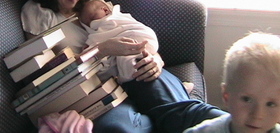
August 2008
I’m chuckling over the word “encounters.” In my Rule of Six (or Seven) list, that word flows naturally: encounters with beauty, encounters with living books, encounters with ideas to ponder and discuss…
But when I lift the phrase out of the list, it becomes comical. My entire day is a series of “encounters” with books. I might as well say I’ve had an encounter with air, or that my feet have encountered floors.
Actually, come to think of it, my feet have had plenty of encounters with books, too, because there is never not a stack somewhere in kicking distance. Right now: beside my bed, next to where I leave my slippers at night—i.e., exactly where I groggily aim my toes in the pre-dawn darkness every single morning. You’d think I’d learn after the sixth or seventh stubbed toe, wouldn’t you?
Narrator: she wouldn’t.
But okay. With what books have I had a particularly close or meaningful encounter in the past week?
When You Reach Me

 Well, I finished our readaloud of The Wind in the Door, the sequel to A Wrinkle in Time. And for once I wasn’t tormented with indecision over what the next readaloud should be: I had Rebecca Stead’s lovely When You Reach Me waiting in the wings. It’s a natural next book after Wrinkle. (But we’re studying the parts of a cell in our biology lessons, so OF COURSE I had to read Wind in the Door first. After that book, you’ll never forget what mitochondria do.)
Well, I finished our readaloud of The Wind in the Door, the sequel to A Wrinkle in Time. And for once I wasn’t tormented with indecision over what the next readaloud should be: I had Rebecca Stead’s lovely When You Reach Me waiting in the wings. It’s a natural next book after Wrinkle. (But we’re studying the parts of a cell in our biology lessons, so OF COURSE I had to read Wind in the Door first. After that book, you’ll never forget what mitochondria do.)
When You Reach Me is, as I expected, going over like gangbusters. Scott listens along with us, and since it’s set in 1979, with a narrator only a year or two older than Scott and I were that year, it feels like home. And Miranda’s Manhattan neighborhood is familiar to us from the years we lived in Queens and worked in Manhattan.
For Huck and Rilla, this setting and time period are new territory, an interesting backdrop to an incredibly gripping story. Miranda’s favorite book is A Wrinkle in Time, and she quotes from it or narrates bits and scenes quite often. I love love love internal references like this: they’re the best kind of organic connection, and our brains loooove connections. I’m always talking about giving kids hooks to hang other knowledge on, like the way the Horrible Histories English monarchs song is a useful set of hooks for us to sort other historical events by. “That happened around the time of King John,” I might say, and the kids burst out with: “Poor King John, what a disaster, rule restrained by Magna Carta.”
Anyway, we’re about a third of the way through When You Reach Me and I’m beside myself with happy anticipation of what’s in store for my listeners.
Tiny Habits

 I’ve also been spending a lot of time with B.J. Fogg’s Tiny Habits, which I devoured when it first came out and have been enjoying revisiting more slowly. One of my 2020 achievements was becoming a certified habit coach via Coach.me, because—as you know if you read Bonny Glen back in the beginning—habits have been a subject of particular interest to me since the day I first picked up a Charlotte Mason book in the mid-’90s.
I’ve also been spending a lot of time with B.J. Fogg’s Tiny Habits, which I devoured when it first came out and have been enjoying revisiting more slowly. One of my 2020 achievements was becoming a certified habit coach via Coach.me, because—as you know if you read Bonny Glen back in the beginning—habits have been a subject of particular interest to me since the day I first picked up a Charlotte Mason book in the mid-’90s.
Tiny Habits adds new layers to the subject through Stanford professor B.J. Fogg’s research on human behavior and what he calls “behavior design.” His premise is that you can coach yourself into any behavior you wish if you approach it incrementally, taking advantage of certain hardwired aspects of human behavior—and that willpower has nothing to do with this process. He explores prompts, ability, and motivation—motivation being the least powerful factor of the three, when it comes to creating a habit.
James Clear’s Atomic Habits and Gretchen Rubin’s Better Than Before also unpack this topic and explore related strategies. Gretchen incorporates her unique and highly useful theory about the Four Tendencies into her discussion of habit formation. I loved her book, because she zeroes in on the importance of understanding yourself (your tendency) in establishing the right bite-sized habit and the best-for-you prompt.
A very long postscript
This post could go on and on, but I’m trying a new practice. I have hundreds of unfinished draft posts sitting in my queue—because life is so full that if I don’t publish them right away, it’s hard to come back later. The momentum is gone. The energy I have for persistent, gradual progress on a piece of writing goes entirely to my books and to my working creating Brave Writer literature guides. But whenever I let my blog slip, I start to feel twitchy. It’s an important chronicle for my family and an important vehicle for my own learning and exploration. I need to write in order to know what I think. And I need to share that writing—narration is such a crucial piece of learning and critical thinking!
So what I’ve decided to try—and I’ll be evaluating the success of this plan in real-time, as I go, probably out loud—is writing for a set amount of time (most days, 45 minutes) and then hitting publish even if I had more thoughts to think, or (as with this post) more books to dish about. I’ve rearranged the day to allow this pocket of time (swapping it out with my Morning Pages practice, because the truth is, Morning Pages bore me silly after about the third day) most mornings. And when the timer goes off, I’ll give it a quick scan for typos and then smash the publish button, even if I had more to say.
I have plenty of outlets for more polished writing. Patreon, Medium, Darts, Arrows, my books. For the first ten years, blogging worked brilliantly for me as a catalyst for discovery and analysis. I resisted the shift toward professionalization of one’s blog and I bristled at the trend toward prioritizing the inclusion of beautiful photos, creating a magazine effect. (Do you know what I do for images here these days, most of the time? I click the “Add Media” button and type a word, loosely related to the content of the post, into the search bar. Then I pick one of the zillion photos I’ve shared here in the past. Thus the ancient snapshot at the top of this post.)
Because social media favors posts with a captivating and properly sized “featured photo,” I kept leaving drafts in the queue to await a moment when I could take or find the right picture. And of course you’re supposed to use keywords and subheads or your SEO plug-in yells at you. Mine loathes the length of my sentences and paragraphs.
And I find that I no longer care. I seldom bother to share links to Bonny Glen posts on Facebook or Twitter any more. I use subheads sparingly and mainly because I love that shade of blue.
This shade
Now, I realize I’ve gone and written a whole second post to explain why I’m publishing the first one practically mid-thought. Once again, I’m thinking out loud, firming up my vague notions by articulating them to you.
This practice—which, again, is an experiment I’m testing to see if it clicks for me—will mean more frequent, less polished posts. If you’re still here reading Bonny Glen after all these years, and through my long silences, I’m guessing you won’t mind. If you ever feel I’ve given short shrift to a topic and you’d like to hear more, please let me know! I’d be happy to tackle it the next time I set the timer.
P.S. No time today for adding book links! If you’d like to give me the affiliate credit, here are links to my Amazon & Bookshop.org portals.

Would you like to receive my blog posts in your inbox? For daily delivery, click here to enter your email address. I also have a monthly newsletter!
Tags: A Wrinkle in Time, BJ Fogg, Blog, Bloggity, encounters with books, Gretchen Rubin, James Clear, Madeleine L'Engle, Rebecca Stead, rule of seven, rule of six, When You Reach Me
January 18, 2010 @ 7:44 am | Filed under:
Books I woke up this morning to the happy news that When You Reach Me won the Newbery Award. I was rooting for it! Here’s what I had to say about it in September:
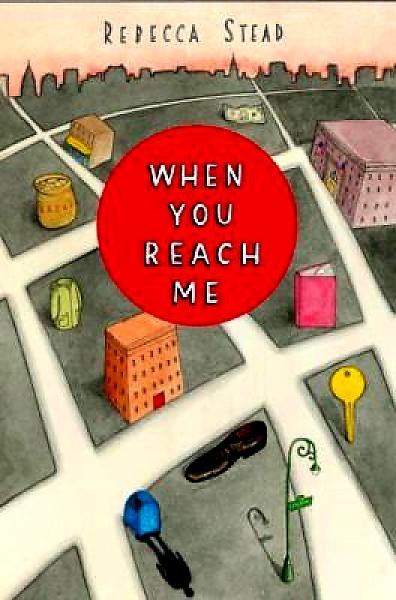 …I want to tell you all about how much I enjoyed Rebecca Stead’s excellent middle-grade novel, When You Reach Me—but if I say anything, practically anything at all, I’ll give away things I’d rather you discovered yourself in the pages of the book, in the perfect way Stead has chosen to reveal them to you. I can say that it’s about a girl who reads A Wrinkle in Time repeatedly, constantly; that her best friend, a boy, abruptly withdraws from her; that her mother is a single, working mom hoping for a chance to shine on $20,000 Pyramid; that it’s 1979; that there’s a mystery; that there are characters I will never forget, completely fresh, completely believable; that I haven’t read a novel that nails the flavor of New York City so perfectly since, gosh, Harriet the Spy. But none of that tells you what I loved most about the book, or what makes it sing, or why I won’t soon forget it. I can’t tell you those things until you’ve read it—and then you won’t need me to, because you’ll know too.
…I want to tell you all about how much I enjoyed Rebecca Stead’s excellent middle-grade novel, When You Reach Me—but if I say anything, practically anything at all, I’ll give away things I’d rather you discovered yourself in the pages of the book, in the perfect way Stead has chosen to reveal them to you. I can say that it’s about a girl who reads A Wrinkle in Time repeatedly, constantly; that her best friend, a boy, abruptly withdraws from her; that her mother is a single, working mom hoping for a chance to shine on $20,000 Pyramid; that it’s 1979; that there’s a mystery; that there are characters I will never forget, completely fresh, completely believable; that I haven’t read a novel that nails the flavor of New York City so perfectly since, gosh, Harriet the Spy. But none of that tells you what I loved most about the book, or what makes it sing, or why I won’t soon forget it. I can’t tell you those things until you’ve read it—and then you won’t need me to, because you’ll know too.
This year’s Newbery Honor books are:
• Claudette Colvin: Twice Toward Justice by Phillip Hoose
• The Mostly True Adventures of Homer P. Figg by Rodman Philbrick
• Where the Mountain Meets the Moon by Grace Lin (we just brought this home home from the library on Saturday; I’d been hearing great things about it)
• The Evolution of Calpurnia Tate by Jacqueline Kelly—here was my response to that one:
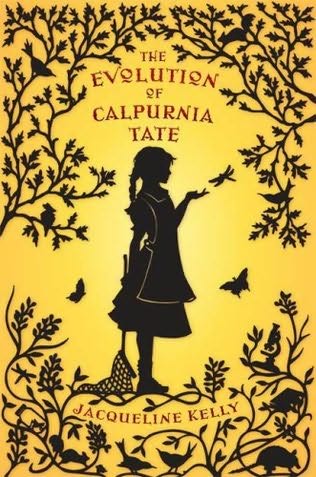 The Evolution of Calpurnia Tate by Jacqueline Kelly. I loved it: this funny, tangy tale of an eleven-year-old girl, surrounded by brothers on a Texas pecan farm in 1899, with a mother yearning for a girly-girl, a fascination with the critters whose doings she records in her very important notebook, and an aloof, bewhiskered grandfather who has never, until now, seemed to notice her existence. I was delighted by the way Callie and her grandfather become acquainted with one another via their mutual interest in the natural world—he’s a correspondent of Charles Darwin and an amateur naturalist and scientist, ever on the lookout for a new species of flora or fauna that might add his name to the rolls of the distinguished discoverers of the day. At first he reacts to Callie rather as if she’s a curious new species herself, and the feeling is mutual. Slowly, they bond…oh, I loved it, the slow revelation of kindred spirits. And meanwhile, there are family antics, and wondrous new technology coming to town (a telephone! an automobile!), and Callie has to figure out how to carve out time for her burning interests when the womenfolk in her life demand piano practice and embroidery and cookery lessons. Certainly there have been many books tackling a girl’s struggles to define and defend her own identity as the people around her seem determined to squeeze her into a mold she isn’t sure fits—I’ve worked with that theme myself, in my Martha books—but I don’t think we’ve ever seen anyone quite like Miss Calpurnia Tate. It’s the setting, the context, that sold me on this book: I’d place it with The Great Brain and Ginger Pye on my mental bookshelf: episodic, comical, historically delicious novels full of eccentric and lovable characters, with that something extra that sets them apart from the crowd.
The Evolution of Calpurnia Tate by Jacqueline Kelly. I loved it: this funny, tangy tale of an eleven-year-old girl, surrounded by brothers on a Texas pecan farm in 1899, with a mother yearning for a girly-girl, a fascination with the critters whose doings she records in her very important notebook, and an aloof, bewhiskered grandfather who has never, until now, seemed to notice her existence. I was delighted by the way Callie and her grandfather become acquainted with one another via their mutual interest in the natural world—he’s a correspondent of Charles Darwin and an amateur naturalist and scientist, ever on the lookout for a new species of flora or fauna that might add his name to the rolls of the distinguished discoverers of the day. At first he reacts to Callie rather as if she’s a curious new species herself, and the feeling is mutual. Slowly, they bond…oh, I loved it, the slow revelation of kindred spirits. And meanwhile, there are family antics, and wondrous new technology coming to town (a telephone! an automobile!), and Callie has to figure out how to carve out time for her burning interests when the womenfolk in her life demand piano practice and embroidery and cookery lessons. Certainly there have been many books tackling a girl’s struggles to define and defend her own identity as the people around her seem determined to squeeze her into a mold she isn’t sure fits—I’ve worked with that theme myself, in my Martha books—but I don’t think we’ve ever seen anyone quite like Miss Calpurnia Tate. It’s the setting, the context, that sold me on this book: I’d place it with The Great Brain and Ginger Pye on my mental bookshelf: episodic, comical, historically delicious novels full of eccentric and lovable characters, with that something extra that sets them apart from the crowd.
SLJ has a list of all this year’s award winners (Caldecott, Printz, Coretta Scott King, etc). Congratulations to all!
Other people’s thoughts, both before and after the awards:
Mother Reader • Semicolon • Educating Alice
Guardian interview with Rebecca Stead:
Stead, who lives in Manhattan with her family, said in an interview with Amazon.com that although she loved A Wrinkle in Time as a child, she hadn’t originally intended to include it in her own prize-winning novel.
“It started out as a small detail in Miranda’s story, a sort of talisman, and one I thought I would eventually jettison, because you can’t just toss A Wrinkle in Time in there casually,” she said. “But as my story went deeper, I saw that I didn’t want to let the book go. I talked about it with my editor, Wendy Lamb, and to others close to the story. And what we decided was that if we were going to bring L’Engle’s story in, we needed to make the book’s relationship to Miranda’s story stronger. So I went back to A Wrinkle in Time and read it again and again, trying to see it as different characters in my own story might (sounds crazy, but it’s possible). And those readings led to new connections.”
September 30, 2009 @ 8:53 pm | Filed under:
Books Why, I wonder, am I so compelled to write about my reading life? I suppose it has something to do with memory, with holding on to things (we recall best those things which we have narrated, as Charlotte Mason was astute enough to recognize), and also with the way putting thoughts into words, written words, shifts vague and swirling impressions to coherent observations, connections, understanding.
Then, too, the urge to talk (write) about books springs also from booklover’s enthusiasm: when I’ve enjoyed something, or even just parts of something, I am eager, eager, eager to share. This creates all sorts of readerly, writerly dilemmas for me: sometimes I start conversations that I can’t squeeze out time to finish (though, in my mind, they are never finished, never closed; and I’m always figuring I’ll have a chance to chime in at some point). Sometimes I want to talk about books that I mostly loved, but I had this one quibble with a plot point, or I thought the ending was weak, or the first-person narrative voice was an unfortunate choice, or—well, any critical observations at all, and if the author is a living person, I find myself completely paralyzed at the prospect of putting my criticism in print. (Which is why, of course, I’m not a book reviewer by trade.)
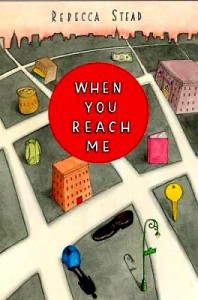 Then, of course, there’s the spoiler problem, over which I’ve sweated here before. For example, I want to tell you all about how much I enjoyed Rebecca Stead’s excellent middle-grade novel, When You Reach Me—but if I say anything, practically anything at all, I’ll give away things I’d rather you discovered yourself in the pages of the book, in the perfect way Stead has chosen to reveal them to you. I can say that it’s about a girl who reads A Wrinkle in Time repeatedly, constantly; that her best friend, a boy, abruptly withdraws from her; that her mother is a single, working mom hoping for a chance to shine on $20,000 Pyramid; that it’s 1979; that there’s a mystery; that there are characters I will never forget, completely fresh, completely believable; that I haven’t read a novel that nails the flavor of New York City so perfectly since, gosh, Harriet the Spy. But none of that tells you what I loved most about the book, or what makes it sing, or why I won’t soon forget it. I can’t tell you those things until you’ve read it—and then you won’t need me to, because you’ll know too.
Then, of course, there’s the spoiler problem, over which I’ve sweated here before. For example, I want to tell you all about how much I enjoyed Rebecca Stead’s excellent middle-grade novel, When You Reach Me—but if I say anything, practically anything at all, I’ll give away things I’d rather you discovered yourself in the pages of the book, in the perfect way Stead has chosen to reveal them to you. I can say that it’s about a girl who reads A Wrinkle in Time repeatedly, constantly; that her best friend, a boy, abruptly withdraws from her; that her mother is a single, working mom hoping for a chance to shine on $20,000 Pyramid; that it’s 1979; that there’s a mystery; that there are characters I will never forget, completely fresh, completely believable; that I haven’t read a novel that nails the flavor of New York City so perfectly since, gosh, Harriet the Spy. But none of that tells you what I loved most about the book, or what makes it sing, or why I won’t soon forget it. I can’t tell you those things until you’ve read it—and then you won’t need me to, because you’ll know too.
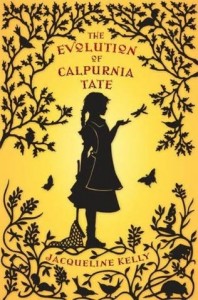 Or how about The Evolution of Calpurnia Tate by Jacqueline Kelly? I loved it: this funny, tangy tale of an eleven-year-old girl, surrounded by brothers on a Texas pecan farm in 1899, with a mother yearning for a girly-girl, a fascination with the critters whose doings she records in her very important notebook, and an aloof, bewhiskered grandfather who has never, until now, seemed to notice her existence. I was delighted by the way Callie and her grandfather become acquainted with one another via their mutual interest in the natural world—he’s a correspondent of Charles Darwin and an amateur naturalist and scientist, ever on the lookout for a new species of flora or fauna that might add his name to the rolls of the distinguished discoverers of the day. At first he reacts to Callie rather as if she’s a curious new species herself, and the feeling is mutual. Slowly, they bond…oh, I loved it, the slow revelation of kindred spirits. And meanwhile, there are family antics, and wondrous new technology coming to town (a telephone! an automobile!), and Callie has to figure out how to carve out time for her burning interests when the womenfolk in her life demand piano practice and embroidery and cookery lessons. Certainly there have been many books tackling a girl’s struggles to define and defend her own identity as the people around her seem determined to squeeze her into a mold she isn’t sure fits—I’ve worked with that theme myself, in my Martha books—but I don’t think we’ve ever seen anyone quite like Miss Calpurnia Tate. It’s the setting, the context, that sold me on this book: I’d place it with The Great Brain and Ginger Pye on my mental bookshelf: episodic, comical, historically delicious novels full of eccentric and lovable characters, with that something extra that sets them apart from the crowd.
Or how about The Evolution of Calpurnia Tate by Jacqueline Kelly? I loved it: this funny, tangy tale of an eleven-year-old girl, surrounded by brothers on a Texas pecan farm in 1899, with a mother yearning for a girly-girl, a fascination with the critters whose doings she records in her very important notebook, and an aloof, bewhiskered grandfather who has never, until now, seemed to notice her existence. I was delighted by the way Callie and her grandfather become acquainted with one another via their mutual interest in the natural world—he’s a correspondent of Charles Darwin and an amateur naturalist and scientist, ever on the lookout for a new species of flora or fauna that might add his name to the rolls of the distinguished discoverers of the day. At first he reacts to Callie rather as if she’s a curious new species herself, and the feeling is mutual. Slowly, they bond…oh, I loved it, the slow revelation of kindred spirits. And meanwhile, there are family antics, and wondrous new technology coming to town (a telephone! an automobile!), and Callie has to figure out how to carve out time for her burning interests when the womenfolk in her life demand piano practice and embroidery and cookery lessons. Certainly there have been many books tackling a girl’s struggles to define and defend her own identity as the people around her seem determined to squeeze her into a mold she isn’t sure fits—I’ve worked with that theme myself, in my Martha books—but I don’t think we’ve ever seen anyone quite like Miss Calpurnia Tate. It’s the setting, the context, that sold me on this book: I’d place it with The Great Brain and Ginger Pye on my mental bookshelf: episodic, comical, historically delicious novels full of eccentric and lovable characters, with that something extra that sets them apart from the crowd.
And I’ve ten times written and deleted a sentence of criticism about one of these two novels, which my what-if-I-hurt-the-writer’s-feelings cowardice will not allow me to keep intact. How’s that for some obnoxious ambiguity?

Well, I finished our readaloud of The Wind in the Door, the sequel to A Wrinkle in Time. And for once I wasn’t tormented with indecision over what the next readaloud should be: I had Rebecca Stead’s lovely When You Reach Me waiting in the wings. It’s a natural next book after Wrinkle. (But we’re studying the parts of a cell in our biology lessons, so OF COURSE I had to read Wind in the Door first. After that book, you’ll never forget what mitochondria do.)
I’ve also been spending a lot of time with B.J. Fogg’s Tiny Habits, which I devoured when it first came out and have been enjoying revisiting more slowly. One of my 2020 achievements was becoming a certified habit coach via Coach.me, because—as you know if you read Bonny Glen back in the beginning—habits have been a subject of particular interest to me since the day I first picked up a Charlotte Mason book in the mid-’90s.







